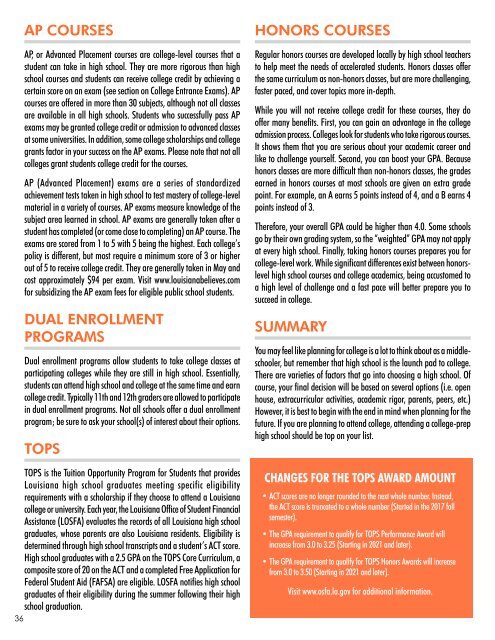New Orleans Guide to High School and Beyond 2018
Create successful ePaper yourself
Turn your PDF publications into a flip-book with our unique Google optimized e-Paper software.
36<br />
AP COURSES<br />
AP, or Advanced Placement courses are college-level courses that a<br />
student can take in high school. They are more rigorous than high<br />
school courses <strong>and</strong> students can receive college credit by achieving a<br />
certain score on an exam (see section on College Entrance Exams). AP<br />
courses are offered in more than 30 subjects, although not all classes<br />
are available in all high schools. Students who successfully pass AP<br />
exams may be granted college credit or admission <strong>to</strong> advanced classes<br />
at some universities. In addition, some college scholarships <strong>and</strong> college<br />
grants fac<strong>to</strong>r in your success on the AP exams. Please note that not all<br />
colleges grant students college credit for the courses.<br />
AP (Advanced Placement) exams are a series of st<strong>and</strong>ardized<br />
achievement tests taken in high school <strong>to</strong> test mastery of college-level<br />
material in a variety of courses. AP exams measure knowledge of the<br />
subject area learned in school. AP exams are generally taken after a<br />
student has completed (or come close <strong>to</strong> completing) an AP course. The<br />
exams are scored from 1 <strong>to</strong> 5 with 5 being the highest. Each college’s<br />
policy is different, but most require a minimum score of 3 or higher<br />
out of 5 <strong>to</strong> receive college credit. They are generally taken in May <strong>and</strong><br />
cost approximately $94 per exam. Visit www.louisianabelieves.com<br />
for subsidizing the AP exam fees for eligible public school students.<br />
DUAL ENROLLMENT<br />
PROGRAMS<br />
Dual enrollment programs allow students <strong>to</strong> take college classes at<br />
participating colleges while they are still in high school. Essentially,<br />
students can attend high school <strong>and</strong> college at the same time <strong>and</strong> earn<br />
college credit. Typically 11th <strong>and</strong> 12th graders are allowed <strong>to</strong> participate<br />
in dual enrollment programs. Not all schools offer a dual enrollment<br />
program; be sure <strong>to</strong> ask your school(s) of interest about their options.<br />
TOPS<br />
TOPS is the Tuition Opportunity Program for Students that provides<br />
Louisiana high school graduates meeting specific eligibility<br />
requirements with a scholarship if they choose <strong>to</strong> attend a Louisiana<br />
college or university. Each year, the Louisiana Office of Student Financial<br />
Assistance (LOSFA) evaluates the records of all Louisiana high school<br />
graduates, whose parents are also Louisiana residents. Eligibility is<br />
determined through high school transcripts <strong>and</strong> a student’s ACT score.<br />
<strong>High</strong> school graduates with a 2.5 GPA on the TOPS Core Curriculum, a<br />
composite score of 20 on the ACT <strong>and</strong> a completed Free Application for<br />
Federal Student Aid (FAFSA) are eligible. LOSFA notifies high school<br />
graduates of their eligibility during the summer following their high<br />
school graduation.<br />
HONORS COURSES<br />
Regular honors courses are developed locally by high school teachers<br />
<strong>to</strong> help meet the needs of accelerated students. Honors classes offer<br />
the same curriculum as non-honors classes, but are more challenging,<br />
faster paced, <strong>and</strong> cover <strong>to</strong>pics more in-depth.<br />
While you will not receive college credit for these courses, they do<br />
offer many benefits. First, you can gain an advantage in the college<br />
admission process. Colleges look for students who take rigorous courses.<br />
It shows them that you are serious about your academic career <strong>and</strong><br />
like <strong>to</strong> challenge yourself. Second, you can boost your GPA. Because<br />
honors classes are more difficult than non-honors classes, the grades<br />
earned in honors courses at most schools are given an extra grade<br />
point. For example, an A earns 5 points instead of 4, <strong>and</strong> a B earns 4<br />
points instead of 3.<br />
Therefore, your overall GPA could be higher than 4.0. Some schools<br />
go by their own grading system, so the “weighted” GPA may not apply<br />
at every high school. Finally, taking honors courses prepares you for<br />
college-level work. While significant differences exist between honorslevel<br />
high school courses <strong>and</strong> college academics, being accus<strong>to</strong>med <strong>to</strong><br />
a high level of challenge <strong>and</strong> a fast pace will better prepare you <strong>to</strong><br />
succeed in college.<br />
SUMMARY<br />
You may feel like planning for college is a lot <strong>to</strong> think about as a middleschooler,<br />
but remember that high school is the launch pad <strong>to</strong> college.<br />
There are varieties of fac<strong>to</strong>rs that go in<strong>to</strong> choosing a high school. Of<br />
course, your final decision will be based on several options (i.e. open<br />
house, extracurricular activities, academic rigor, parents, peers, etc.)<br />
However, it is best <strong>to</strong> begin with the end in mind when planning for the<br />
future. If you are planning <strong>to</strong> attend college, attending a college-prep<br />
high school should be <strong>to</strong>p on your list.<br />
CHANGES FOR THE TOPS AWARD AMOUNT<br />
• ACT scores are no longer rounded <strong>to</strong> the next whole number. Instead,<br />
the ACT score is truncated <strong>to</strong> a whole number (Started in the 2017 fall<br />
semester).<br />
• The GPA requirement <strong>to</strong> qualify for TOPS Performance Award will<br />
increase from 3.0 <strong>to</strong> 3.25 (Starting in 2021 <strong>and</strong> later).<br />
• The GPA requirement <strong>to</strong> qualify for TOPS Honors Awards will increase<br />
from 3.0 <strong>to</strong> 3.50 (Starting in 2021 <strong>and</strong> later).<br />
Visit www.osfa.la.gov for additional information.
















